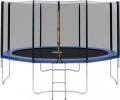Net
The type of safety net provided in the design of the trampoline.
For details on the grids themselves, see "Packaging", and their types can be as follows:
-
External. Mesh stretched over supports from the outside. This design leaves the maximum possible area of the trampoline open, but requires care so that the jumper does not hit the stand or step on the cape covering the springs. Therefore, this option is recommended primarily for adults, more or less experienced users.
-
Internal. Mesh stretched over supports from the inside. With the same dimensions of the trampoline, it leaves less free space than the outer one. At the same time, the net supports and the springs of the trampoline itself remain behind the fence, and the risk of an unpleasant collision with them is minimal. Therefore, for children, especially small ones, it is internal nets that are recommended.
Maximum weight
The greatest load that a trampoline is designed for, in other words, the total weight of people that it is able to transfer without consequences. This parameter is one of the main when choosing a trampoline. In no case should you exceed the maximum load, this is fraught with equipment breakdowns and serious injuries to athletes (moreover, such a nuisance can occur after exposure to an abnormal load, under a completely permissible weight). Accordingly, when choosing, it is worthwhile to clearly determine the maximum load that the product can be subjected to.
High maximum load values are especially important when installed in trampoline centers, gyms and other public places where the circle of potential athletes is unlimited, and among them there may be people of a very large build.
Trampoline size (LxWxH)
The overall size of the trampoline; in this case, the height can be measured both by the height of the working surface, without taking into account the protective grid and other additional devices, and by the overall dimensions of the product in the working position. Also note that the size of the working area on the canvas is usually less than the overall dimensions in length and width — there is protection along the edges that covers the springs, and it is undesirable to jump on it.
Mesh height
The height of the regular trampoline protective net (see "Complete set"). This height is usually measured from the working surface, which allows you to evaluate the protective properties of the mesh. The higher it is, the better, but in general it is desirable that the height is not lower than the height of the intended user (or at least slightly lower).
Number of springs
The number of springs provided in the design of the trampoline of the corresponding type (see above).
The smaller the springs, the larger and thicker each of them must be in order to normally carry their “portion” of the load. However manufacturers usually choose the thickness and quantity in such a way as to achieve the required performance. Therefore, from the user's point of view, there is no key difference between an abundance of small springs and a few large ones, and this parameter, in fact, is purely reference.

